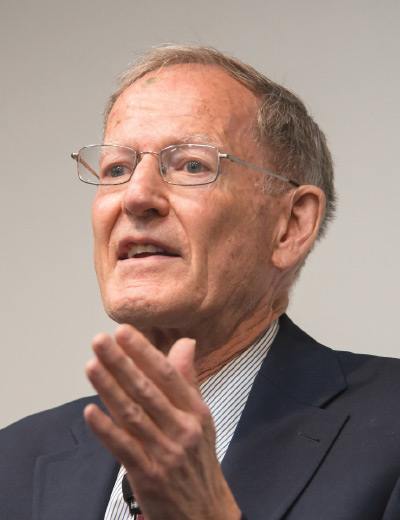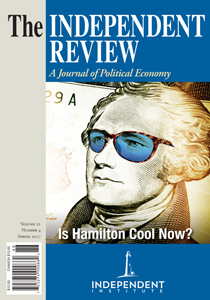George F. Gilder is Chairman of George Gilder Fund Management, Senior Fellow at the Discovery Institute, and a founding Member of the Board of Advisors for the Independent Institute.

Born in 1939 in New York City, Mr. Gilder attended Exeter Academy and Harvard University. At Harvard, he studied under Henry Kissinger and helped found Advance, a journal of political thought, which he edited and helped to re-establish in Washington, DC after his graduation in 1962. During this period he co-authored (with Bruce Chapman) The Party That Lost Its Head. He later returned to Harvard as a fellow at the Kennedy Institute of Politics and editor of the Ripon Forum. In the 1960s Mr. Gilder also served as a speechwriter for several prominent official and candidates, including Nelson Rockefeller, George Romney, and Richard Nixon. In the 1970s, as an independent researcher and writer, Mr. Gilder began an excursion into the causes of poverty, which resulted in his books Men and Marriage (1972) and Visible Man (1978); and hence, of wealth, which led to his best-selling Wealth and Poverty (1981).
Mr. Gilder pioneered the formulation of supply-side economics when he served as Chairman of the Lehrman Institute's Economic Roundtable, as Program Director for the Manhattan Institute, and as a frequent contributor to A.B. Laffer's economic reports and the editorial page of The Wall Street Journal.
In the 1980s he also consulted leaders of America's high technology businesses. According to a study of presidential speeches, Mr. Gilder was President Reagan's most frequently quoted living author. In 1986, President Reagan gave George Gilder the White House Award for Entrepreneurial Excellence.
In 1996 Gilder was made a Fellow of the International Engineering Consortium. The investigation into wealth creation led Mr. Gilder into deeper examination of the lives of present-day entrepreneurs, culminating in many articles and a book, The Spirit of Enterprise (1986). The book was revised and republished in 1992. That many of the most interesting current entrepreneurs were to be found in high technology fields also led Mr. Gilder, over several years, to examine this subject in depth. In his best-selling work, Microcosm (1989), he explored the quantum roots of the new electronic technologies. A subsequent book, Life After Television, was a prophecy of the future of computers and telecommunications and a prelude to his book on the future of telecommunications, Telecosm (2000).
Mr. Gilder's book The Silicon Eye (2005) travels the rocky road of the entrepreneur on the promising path of disruption, and celebrates some of smartest-and most colorful-technology minds of our time. In this fascinating narrative of personality and technology, Gilder shares his insider knowledge of Silicon Valley and illustrates how the unpredictable mix of genius, drive, and luck that can turn a startup into a Fortune 500 company.
His other books include Knowledge and Power: The Information Theory of Capitalism and How It is Revolutionizing Our World, The Israel Test, The Meaning of the Microcosm, The Scandal of Money: Why Wall Street Recovers but the Economy Never Does, Recapturing the Spirit of Enterprise, Life After Google, Gaming AI: Why AI Can't Think but Can Transform Jobs, and Life After Capitalism.
Mr. Gilder is a frequent writer for The Economist, American Spectator, Harvard Business Review, Wall Street Journal, and other publications.









